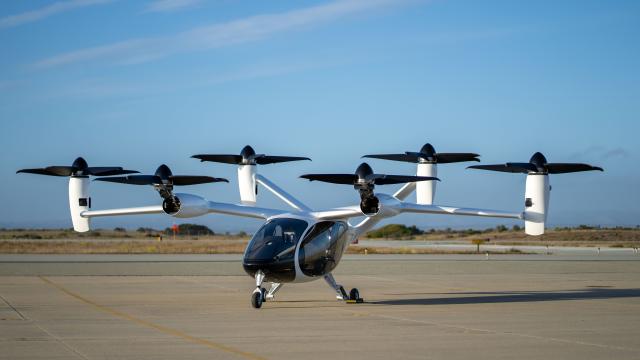Joby Aviation announced today that it has received the first of three required approvals from the Federal Aviation Administration (FAA). This new clearance would allow the company to operate its proposed, on-demand air taxi service commercially.
However, before that theoretical possibility materialises into 5-propellor, electric aircrafts regularly scooping you up from the street, Joby has a few more big regulatory hoops to jump through.
The company has specifically received an FAA Part 135 Air Carrier Certificate, reportedly ahead of schedule, which is a step forward. This FAA certification means that Joby can operate as an aircraft carrier. It can now start testing and further developing tech operations behind its planned future service, like the pilot facing coordination system and a consumer app, a representative from Joby told Gizmodo in a phone call.
But Joby still needs FAA type certification for its prototype electric vertical-take-off and landing vehicle (known as an “eVTOL”). The tech company which has dubbed itself the future “Uber of the Air,” doesn’t have approval to actually transport people around in its specialised aircraft yet. If and when the company does get that rubber stamp, Joby will then have to add their eVTOL aircraft to their carrier certificate.
Finally, the company will need to obtain production certification, in a third FAA approval process in order to manufacture an eVTOL fleet.
Joby’s eVTOL are five-propeller vehicles that look kind of like a helicopter and also kind of like a white iPod classic (R.I.P). According to the company website, the aircrafts seat five people, have a range of over 241 km on a single charge, and can fly up to 200 miles per hour.
But so far, those stats haven’t been on display. A February test flight of a remotely piloted Joby prototype ended in a crash, in which no one was injured, according to a company SEC filing. The cause of the crash was enigmatically reported as a “component failure” that led to “substantial damage” to the aircraft, in a preliminary report from the National Transportation Safety Board.
The crashed Joby prototype was reportedly one of only two in existence, according to a report from eVTOL, a media outlet which reports on the vehicles.
Joby went public last August. Since its introduction on the stock market, its share prices have fallen more than 43%. The company has also posted a net loss for the past two quarters. In the first quarter of 2022, that loss was about $US62.3 ($86) million, and in the last report released in 2021, it was about $US78.9 ($110) million.
So, at least the company currently has its struggle for profitability in common with Uber.
